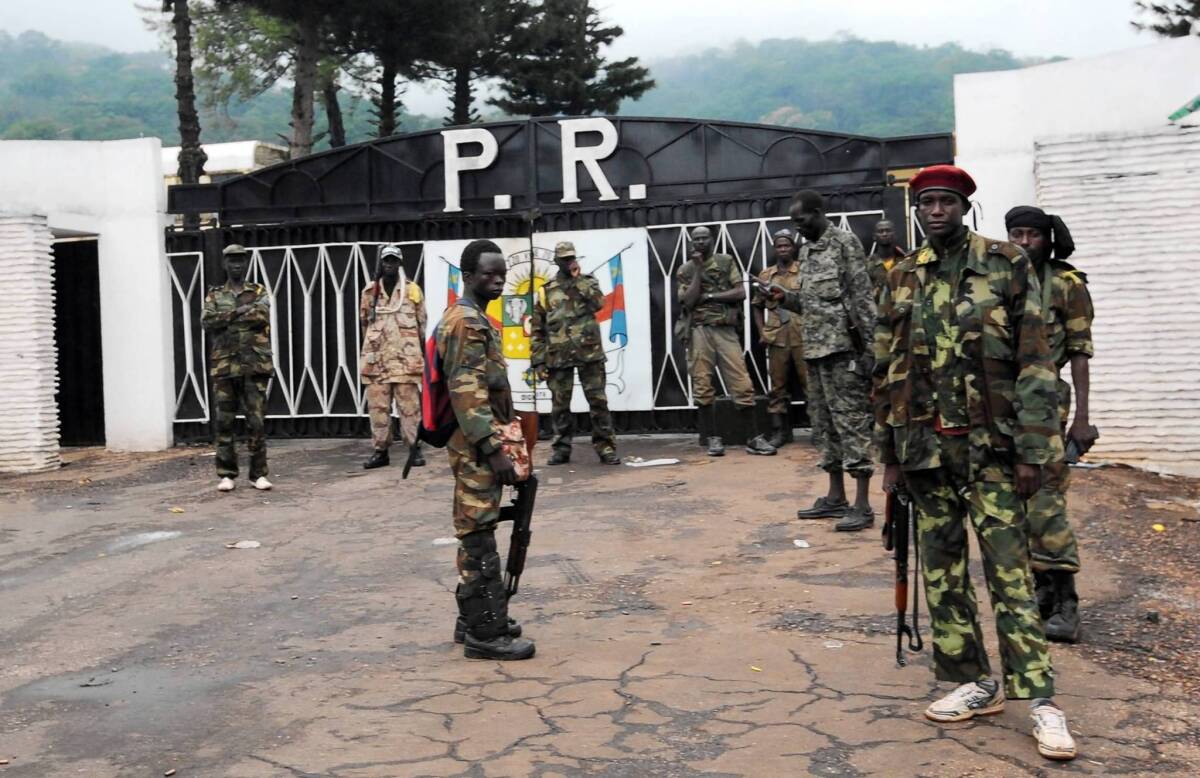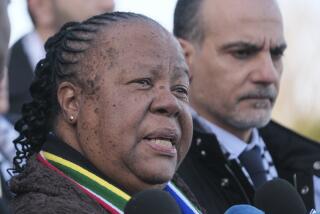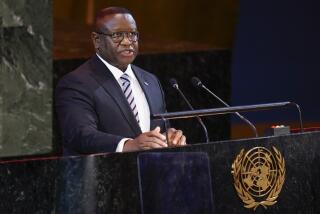African Union suspends Central African Republic after coup

JOHANNESBURG, South Africa —The African Union suspended the Central African Republic on Monday and imposed sanctions after President Francois Bozize’s ouster, warning that rebel coup leaders could face trial.
In an ominous sign that could presage more fighting, the rebels appeared deeply divided, openly contradicting one another about who should be leader. One rebel leader threatened more violence, indicating he was willing to attack other rebels.
South African President Jacob Zuma condemned the rebels as “bandits” at a news conference in Pretoria, confirming the deaths of at least 13 South African soldiers in a nine-hour battle. Twenty-seven others were wounded.
“It is a sad moment for our country,” Zuma said, as controversy raged over the government’s failure to pull out its forces. “Our soldiers paid the ultimate price in the service of their country. Just over 200 of our soldiers fought bandits who wanted to cause harm, but the actions of these bandits would not deter us from our mission of peace and security.”
Zuma added that South Africa rejects any seizure of power by force.
The African Union’s peace and security chief, Ramtane Lamamra, called on the organization’s members to isolate the leaders of the rebel alliance, known as Seleka, and requested that they support any other future steps by the union, including the trial of the rebels for toppling the president.
“The council has decided to suspend with immediate effect Central African Republic from all African Union activities and to impose sanctions, travel restrictions and an asset freeze on Seleka’s leaders,” said Lamamra, addressing journalists in Addis Ababa, Ethiopia.
African Union Chairwoman Nkosazana Dlamini-Zuma, a senior South African official and former wife of Zuma, condemned the rebel takeover, as did United Nations Secretary-General Ban Ki-moon.
Seleka rebels, an alliance of militias from the north of the country, swept into the capital, Bangui, on Saturday, seized the presidential palace after heavy fighting and took control Sunday. Bozize fled the country and is reportedly in Cameroon, but he has made no statement since the rebels took power.
One rebel leader, Michel Djotodia, declared himself the new president in an interview Monday with Radio France International. But another, Nelson Ndjadder, said in an interview with the Associated Press in Paris that the rebels didn’t recognize Djotodia, adding that he could topple him.
“We do not recognize him as president.... For your information, I have enough soldiers loyal to me to attack Djotodia,” he said. Ndjadder said the original plan was to arrest Bozize and announce a swift transition. He accused Djotodia’s forces of looting people’s houses.
“We came to liberate the people, not to steal from them. This is shameful. Unacceptable,” he said.
In an effort to calm the storm of international criticism, Djotodia said he would keep many members of the government of national unity formed in January, including the prime minister, Nicolas Tiangaye, who was drawn from the opposition.
“We will not conduct a witch hunt,” he said. He promised elections within three years, in accordance with the January peace deal, but wouldn’t say how long he planned to remain president.
“I can’t say because you know full well that we need time to bring back peace. There is insecurity,” Djotodia said.
Despite its wealth in mineral resources, the Central African Republic remains one of the poorest and most badly governed countries. It has seen successive coups and uprisings since independence from France in 1960.
The Seleka rebels took up arms in December, accusing Bozize of failing to keep peace agreements made beginning in 2007 with various militias. In January they signed a peace deal and suspended their rapid advance on Bangui. The deal set up a government of national unity and allowed Bozize to stay in office until his term expires in 2016, but it didn’t last long. Last week, the rebels repudiated the deal, claiming their demands hadn’t been met.
The advance by the rebels underscored the chronic weakness of the national army. It was mistrusted by Bozize, who took power in a 2003 coup. The swift advance also suggested the rebels might have been getting outside support.
The South African force was sent to the Central African Republic in January as part of a peacekeeping mission and to train the army.
South African commander Gen. Solly Shoke ruled out a withdrawal of his troops, saying that would amount to running away.
“It’s not for me to decide whether the troops will come back home. We are soldiers. For us, running away is not an option,” Shoke said.
South Africa’s military union called on the president to withdraw the nation’s forces, saying they had no mandate to remain in the Central African Republic after Bozize fled. Some South African critics questioned why the troops were deployed there, given the nation’s entrenched corruption and history of bad governance.
More to Read
Start your day right
Sign up for Essential California for news, features and recommendations from the L.A. Times and beyond in your inbox six days a week.
You may occasionally receive promotional content from the Los Angeles Times.






